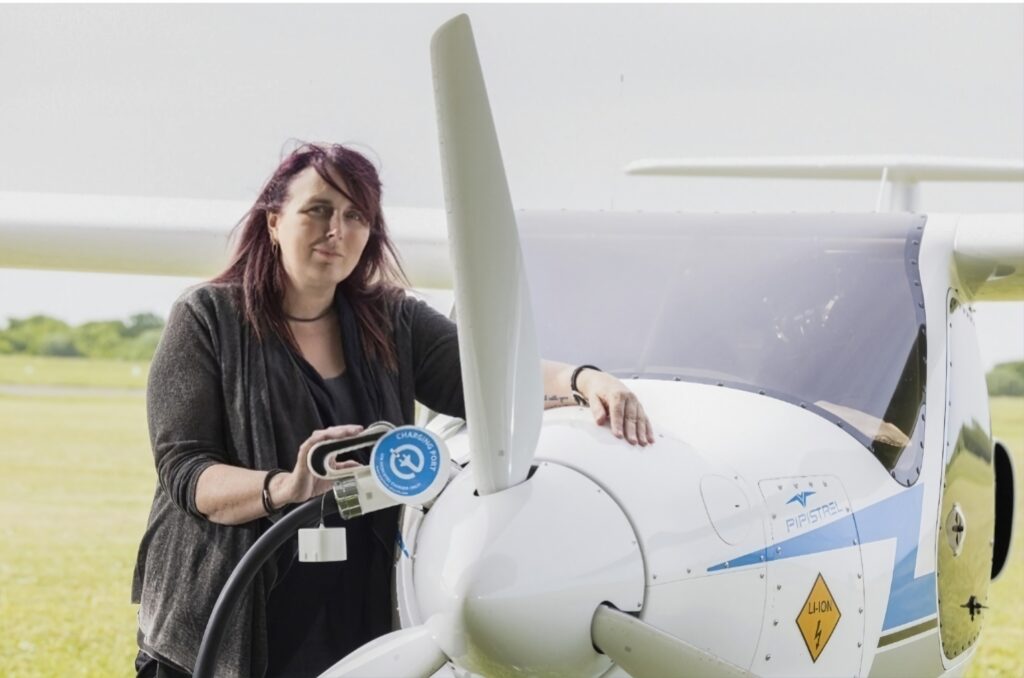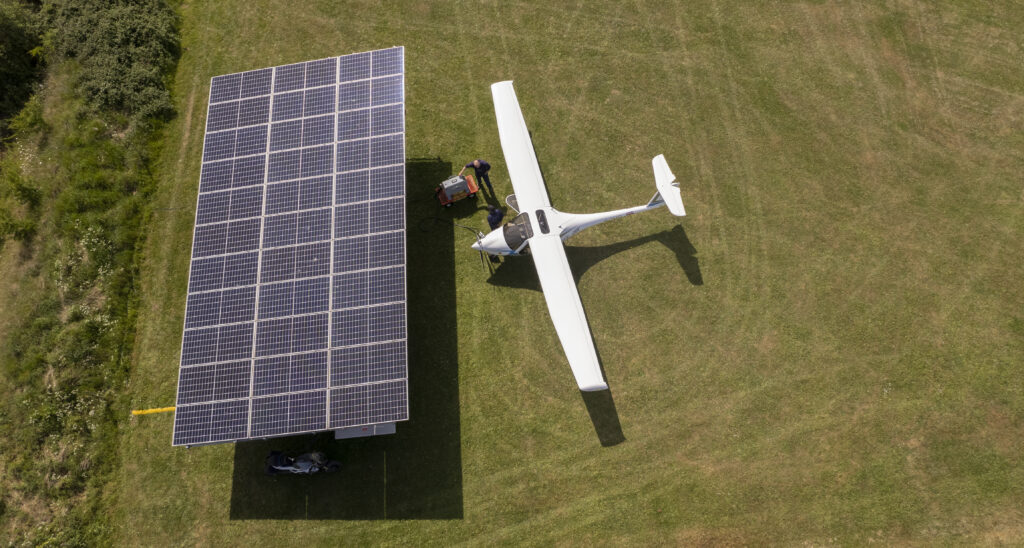 Kerry Wilmot is on a mission to raise awareness about the world’s first type certified all-electric aircraft — the Pipistrel Velis Electro — and convince flying schools in the UK to use the two-seater to train pilots more sustainably.
Kerry Wilmot is on a mission to raise awareness about the world’s first type certified all-electric aircraft — the Pipistrel Velis Electro — and convince flying schools in the UK to use the two-seater to train pilots more sustainably.
Wilmot is co-director of NEBOair, a sister company to UK-based Pipistrel aircraft distributor Fly About Aviation and owner of seven Velis Electros.
“The reason NEBOair was put together was that the sustainable journey was on a completely different pathway to normal aircraft sales, so we felt it needed to have its own blanket around it,” Wilmot tells Runway Girl Network.
She emphasizes that “we’re absolutely not an airline”. NEBOair’s purpose is “to promote sustainable flight training and to engage with both professional people and [members of] the public who would like to learn more about that pathway”.
The Velis Electro is fully approved by the European Union Aviation Safety Agency (EASA) for pilot training and can also be operated commercially. Its 57.6kW engine is powered by a liquid-cooled dual-battery system, which takes about an hour to charge. The aircraft has an on-paper endurance of 50 minutes, although Wilmot says that, in reality, “the aircraft will fly for 45 minutes”.
“If by any chance you lost all battery power, there’s a 20-minute auxiliary battery in the cockpit that automatically takes over, and if you lost all power she’s a 15:1 glide ratio so you can still get her down,” she adds.
Trainee pilots can complete “approximately 85%” of their private pilot license (PPL) training and “virtually” all of their light aircraft pilot license (LAPL) training on the Velis Electro, says Wilmot. NEBOair has already placed Velis Electros with a handful of flying schools in the UK, including London Airsports Centre, Three Counties and Norwich-based Saxon Air, which used the aircraft for Difference Training for its own pilots. The company is also “in the last stages of discussion” with two more flying schools, says Wilmot.
“Every pilot that learns to fly puts approximately 5.5 tons of CO2 up there, but the Velis flies emissions-free,” she notes, adding that offering “youngsters” who are “very aware” of their carbon footprint an “emissions-free option where they can do a huge percentage of their flight training” could entice people to learn to fly who may otherwise have shunned it for environmental reasons.
On the public awareness side, NEBOair’s Velis Electros have performed “sustainable air displays” at air shows, and Wilmot says she has received a number of recent calls from air show organizers interested in featuring the aircraft in their displays.
The company has also been working with the UK government on a ‘Sunlight to Flight’ study, which used NEBOair’s solar-powered charging station to demonstrate how electric flight can be powered entirely off-grid by renewable energy. NEBOair is keen to see the development of an electric aircraft charging network across the UK.
Running costs of the Velis Electro do not differ much from those of similarly-sized fossil fuel-powered training aircraft, largely due to the higher cost of insuring it, although this is expected to come down.
“If you liken her to a Cessna or a Piper, the costs of running are comparable — maintenance is a lot cheaper but insurance is more expensive,” says Wilmot. “On a lesson, you’re going to be using £40-50 ($49-61) worth of fuel [on a fossil fuel-powered aircraft] or £7-8 of electricity [on the Velis Electro].”
In 2020, insurance costs for the Velis Electro were £12,500 a year, says Wilmot. This has since come down to £7,500, although it is still “double the amount” it costs to insure a similarly-sized fossil fuel-powered aircraft.
Wilmot speaks passionately about her desire for the UK to “lead the world” in sustainable flight training. While she did not have a background in aviation prior to joining NEBOair at its inception, there is a horsepower connection.
“My background was horses. I was head of equestrian at a private school for 10 years and before that I worked with racehorses,” she says, adding that she has always had a “huge interest” in old military aircraft. “It is a learning curve but I think if you’re passionate about something, you can learn. To come in at the start of sustainable aviation, everybody’s learning as we go along.”
If electric flight takes off in the way NEBOair is hoping it will, the company has a pipeline of pre-ordered Velis Electros it can tap into.
“We’ve got 40 aircraft on pre-order and as soon as we want to take delivery, we can,” says Wilmot.
Related Articles:
- Textron looks to realize electric GA and UAM ambitions
- Eyeing hydrogen power iconic Islander returns to UK production
- UK MoD sees promise in Swift composite aerobatic plane
- Elfly chooses batteries for NoEmi flying boat prototype
- First woman to cross the Atlantic in LSA shows spirited resolve
- Deutsche Aircraft on the real-world sustainability of its D328eco
- Diehl Aviation sees eVTOLs as part of green intermodal solution
All images credited to NEBOair












